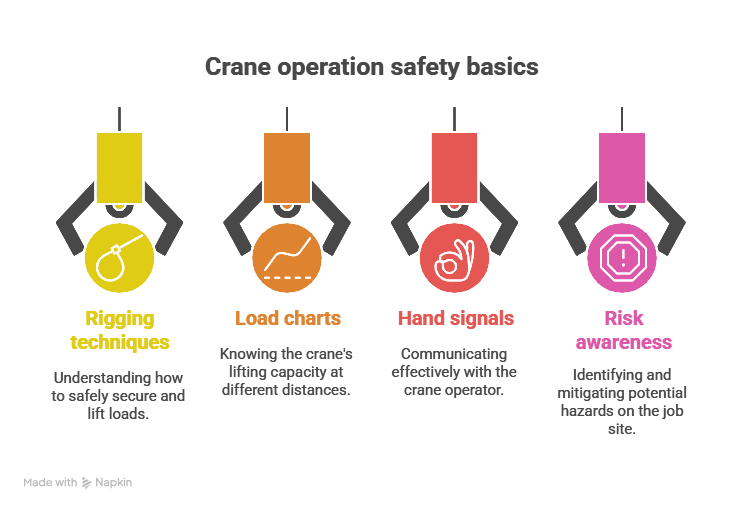
Crane operator licensing it might sound complex, but this guide walks you through every step. From federal requirements to state-specific licenses, training pathways, costs, timelines, and job outlook. Let’s get you rolling.
License vs. Certification vs. Employer Qualification: What’s the Difference?
Federal Baseline (OSHA 29 CFR 1926.1427)
Under OSHA’s standard 29 CFR 1926.1427, employers must train operators through both formal instruction and hands-on practice, and also ensure they are evaluated and certified or licensed before operating cranes on the job. Where a state or local government issues an operator license meeting industry-recognized testing criteria, that license satisfies the OSHA requirement. (OSHA).
National Certification Bodies (e.g., NCCCO)
Many operators earn certification through bodies like the National Commission for the Certification of Crane Operators (NCCCO). These programs include written and practical exams across crane types and act as the go-to credential for federal and employer standards. (NCCCO)
When a Separate State/City LICENSE Is Required
In some states, such as New York State, New York City, and Chicago, you must also obtain a specific local license in addition to your certification.
Eligibility Checklist (Before You Apply)
Age, Education, Medical, and Driver’s License
Most programs require you to be at least 18 years old (21 in some areas) and physically fit (per ASME/NCCCO standards).
Safety Basics to Learn Early
Familiarize yourself with:
- Rigging techniques
- Load charts and capacity calculations
- Hand and voice signals
- Basic risk awareness
These are essential for both training and the written exam.

The Training Pathways (How to Prepare)
Union Apprenticeships vs. Private Schools vs. Community Colleges
- Union Apprenticeships (e.g., IUOE): Companies train you on real sites, and many costs are employer-covered.
- Private Schools: Offer concentrated, paid programs (from $5,000 and up) that bundle written and practical exam prep.
- Community Colleges: Often provide prep courses and coordinated practical sessions.
What a Good Prep Program Includes
- Classroom lessons on OSHA rules, signals, and safety
- Simulated seat-time on cranes
- Exam practice and test strategy
Sample Study Plan (4 to 8 Weeks)
Week 1: Fundamentals and load chart drills
Week 2: Written exam prep and practice tests
Weeks 3-4: Hands-on sim training
Week 5-6: Full mock exams and review
Week 7-8: Fine-tune weaknesses, rest well
Passing Your Exams (Written + Practical)
How the Written Exam Works
Tests cover load calculations, safety, site setup, and signals. Many require passing both a core plus one or more specialty exams (e.g., lattice boom, telescopic).
How the Practical Exam Works
You’ll execute real crane maneuvers, setup, smooth operation, and precision. Expect common pitfalls like load control and stabilizing outriggers.
ADA Accommodations & Scheduling
Most testing bodies allow accommodations to be submitted early and provide documentation.
Getting the Actual LICENSE in States/Cities That Require It
New York State (outside NYC)
You need a Crane Operator Certificate of Competence issued by the NY State Department of Labor. It’s mandatory for cranes used in construction, demolition, and excavation, and it satisfies OSHA’s rules.
New York City Hoisting Machine Operator (HMO) License
NYC classes (A, B, C) have unique requirements:
Age & fitness: at least 18, English literacy, good moral character
Certifications :
- Class A: NCCCO certifications in TLL, TSS, and LAT
- Class B: Adds TWR to the above
- Class C: Requires TLL and TSS only
40-hour course: Must complete a Department-approved 40-hour course within 1 year of application.
Experience: 3 years of supervised NYC operation with at least 100 crane setups (50-ton mobile or tower for 2 years of that).
City of Chicago Crane Operator License
Mandatory for cranes ≥2,000 lbs (most cranes)
Exams:
- Written: $150/exam
- Practical: $250 per equipment type
- Initial License (5-year): $300; Renewal: $300
Licenses last 5 years.
Include supervisor-verified experience; submit via city portal
Other States That License Crane Operators
- Illinois: Must be 21, 2,000 hours in 48 months, or completed an apprenticeship, physical fitness, and no recent substance abuse issues.
- Additional states (CT, MA, NJ, PA, RI) may have licenses always check your state’s Department of Labor or Licensing site.
Cost Breakdown (Training, Exams, Licensing, Renewal)
| Cost Item | Typical Range |
| Training program (private school) | $4,000–$5,500 (includes exams) |
| Written exam (Chicago) | $150 |
| Practical exam (Chicago) | $250 per equipment type |
| Initial license (Chicago) | $300 (5-year) |
| Renewal fee | $300 (5-year |
| NYC 40-hour course | Typically several hundred dollars (varies) |
| NYS Certificate of Competence | Administrative fee (check state portal) |
Who Pays What?
- Union or employers often sponsor training and fees.
- Self-funded learners must budget for course, travel, exam, and license costs.
Timeline: How Long It Really Takes
Fast-Track vs. Apprenticeship
- Fast-track courses: 3-4 weeks intensive programs; e.g., PTS’s 120-hour course takes 3 weeks.
- Apprenticeships: Can span several years; Reddit experience: “years to become qualified
Scheduling Delays
Factor in testing availability, application wait times, and seasonal demand per region.
Renewal and Staying Current
Certification Renewal Cycles
NCCCO certifications typically expire in 5 years, and renewal may require Continuing Education Credits (CECs) or exams.
City/State License Renewals
Chicago: License valid 5 years; renew through portal.
NYC: Renewal specifics vary confirm via DOB portal.
Safety Refreshers and Employer Re-Evaluation
Employers must retrain operators if performance or safety gaps emerge, per OSHA.
Picking Your Specialty (And Why It Matters for Pay)
Types of Cranes
Mobile, tower, rough-terrain, and overhead each require different skills, training, and certifications.
Endorsements = More Job Opportunities and Higher Pay
Having multiple NCCCO endorsements (e.g., lattice boom + tower crane) opens higher-paying roles and broader site access.
Jobs, Pay, and Outlook
- BLS (2023): Mean annual wage for crane and tower operators: $68,040; median $64,690; 75th percentile $78,720.
- Material Moving Operators (2024): Median pay $66,370.
- Industry Focus: Construction, manufacturing, ports, heavy civil.
- Top Pay Insider Insight: Reddit users cite $60/hr and a six-figure annual income with overtime.
- Career Path: With experience, operators can become supervisors, inspectors, or trainers.
Step-By-Step Checklist (Printable)
- Confirm eligibility (age, medical, physical)
- Complete safety basics (signals, rigging, load charts)
- Choose training path (fast-track or apprenticeship)
- Study and prepare for exams (written + practical)
- Get OSHA-compliant certification (e.g., NCCCO)
- If required, apply for state/city license (NYS, NYC, Chicago)
- Take and pass the required exams
- Apply for and pay for a license
- Start job hunting with certifications and a license in hand
- Track expiration dates and prepare for renewal
Common Mistakes to Avoid
- Skipping local license research: NYC, Chicago, and some states have extra rules.
- Ignoring load-chart practice: One of the main causes of exam failures.
- Letting your certification lapse: Put renewal reminders on your calendar now.
Resources (Bookmark These)
- OSHA Operator Qualification Standard (29 CFR 1926.1427): Federal baseline for training & licensing
- NCCCO Candidate Handbook & Exam Info: Certification outline and exam steps
- NY State DOL Crane Exams Page: Certificate process & requirements
- NYC DOB HMO Licensing Portal: Class requirements and portal access
- City of Chicago Crane Operator Info: Fees, exam details, application portal
Frequently Asked Questions
1. Do I need a license if I already have NCCCO certification?
Yes, if your state or city requires a local license (e.g., NYS, NYC, Chicago), certification alone isn’t enough. You must complete the local license process, too.
2. How often do I need to renew in NYC?
NYC HMO licenses have structured renewal cycles, confirm timelines, and documentation requirements via the DOB NOW.
3. Which cranes need a license in Chicago?
Any crane or hoisting equipment with a rated capacity of 2,000 lbs or more mandates a licensed operator.
4. How much does training usually cost?
Expect to spend $4,000–$5,500 for fast-track programs that include exams. Self-study, online prep, or apprenticeship routes offer cost variation.
5. Are there funding options for veterans or apprentices?
Yes, many union apprenticeships and vocational programs offer veteran benefits and employer-paid training. Always inquire through the program or union directly.
GIPHY App Key not set. Please check settings